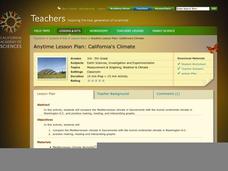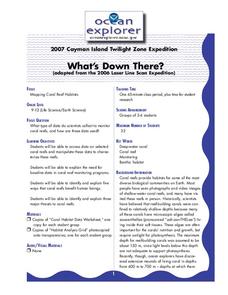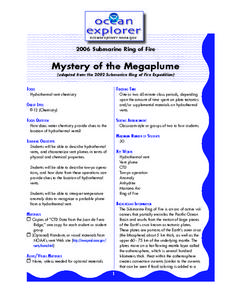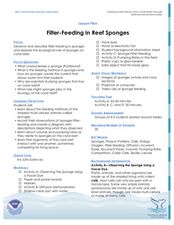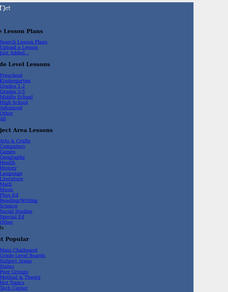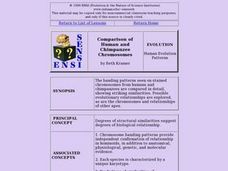California Academy of Science
California's Climate
The United States is a large country with many different climates. Graph and analyze temperature and rainfall data for Sacramento and Washington DC as you teach your class about the characteristics of Mediterranean climates. Discuss the...
Science Geek
Properties of Acids and Bases
It's all about that base! Teach the properties of acids and bases using the sixth slide show presentation in a series of seven. The lesson discusses acid and base properties and reactions. Pupils also see the effect on indicators when...
Curated OER
Asexual Reproduction
Presented clearly and accurately, this PowerPoint introduces biology learners to asexual reproduction in plants. It begins by comparing asexual to sexual reproduction by definition and by the pros and cons of each. The remaining slides...
Colorado State University
Why Are Clouds White?
Is it possible to change the color of clouds? A three-part activity explores the scattering of light by the water droplets that make up clouds. After observing a demonstration, curious scholars conduct their own investigations of the...
Science 4 Inquiry
The Real Story of Where Babies Come From
Pupils learn about both male and female anatomy before understanding how they work together to make a baby. Scholars discover new vocabulary, create a presentation on fertilization, and discuss related topics.
Curated OER
What's Down There?
High schoolers analyze data on coral reefs and use this to help characterize reefs. In this mapping coral reefs lesson students identify and explain the major threats to coral reefs.
University of Kentucky
Beneficial Bug Scavenger Hunt
Many people think of bugs as annoying pests to be squashed, but most insects and spiders are beneficial, eating the actual pests or pollinating plants. After reviewing some of the common bugs in your area (they may differ from those...
University of Georgia
What's So Special about Bottled Drinking Water?
Is artesian water designed to be better, or is it just from wells similar to those in the city of Artesium? This experiment looks at many different types of bottled waters, including artesian. Using a soap mixture, scholars test to see...
NOAA
Tides
Low tides, high tides, spring tides, neap tides, diurnal tides, semidiurnal tides, mixed tides ... just how many types of tides are there? The 10th installment of a 23-part NOAA Enrichment in Marine sciences and Oceanography (NEMO)...
Curated OER
Energy Conservation Games
Middle school physicsl science explorers play a game using dominoes that you have photocopied onto cardstock. Through the game, they familiarize themselves with the conservation of energy and the transformatin from one form to another....
Curated OER
Mystery of the Megaplume
Read through the extensive background information and then lead your geology or physical oceanography class through an investigation of actual temperature anomaly data from the Juan de Fuca ridge. They translate the data onto a plot,...
Curated OER
Super Stream Keeper's
Students are introduced to Delaware's waterways as precious resources used for drinking water, water for agricultural and industrial uses, recreational areas, and as habitats for wildlife. They are introduced to wastewater discharges,...
Curated OER
Archaeology
Students compare and contrast the role of scientists with that of archaeologists. They also describe the roles of observations and evidence in science.
Curated OER
Stellar Discoveries That Are Out of This World
Students hear of the recent discovery of a group of planets orbiting the star Upsilon Andromedae. Each student create a page about an element of the universe,
Curated OER
Monkey See, Monkey Do
Students consider the influence of bullies and map the social ecosystem of their schools. They create lifelines that compare baboon and human development and write an essay that considers the relationship between psychosocial development...
Curated OER
Investigating the Method by Which the Body Defends Against Pathogens
Students explore disease caused by bacteria and viruses, how they are transmitted, and how they exert their effects on their hosts. They explain how diseases, such as AIDS, are spread by exponential growth.
Curated OER
Energy Conservation Games
Students become acquainted with the first law of thermodynamics, which concerns the conservation of energy as it is transformed from one form to another. They identify forms of energy, and devices or processes that transform energy from...
Curated OER
Filter Feeding in Reef Sponges
Students investigate the role of sponges in our oceans. In this biology lesson, students create a diagram visualizing how sponges bring food into their bodies through a filtering process. Students discuss the connections between...
Curated OER
Filter-Feeding in Reef Sponges
Students make observations and describe the filter-feeding in sponges as it relates to the ecological role of sponges on coral reefs. In this filter-feeding in reef sponges lesson, students are introduced to the feeding methods of...
Curated OER
Living With the Heat: The Ring of Fire
Students investigate the planet Earth's infamous ring of fire and the life that thrives from it. In this ocean environment lesson plan, students investigate hydrothermal vents and how organisms thrive off their heat. Students complete...
Curated OER
Frogs and Toads Are Different
Second graders identify the unique characteristics of frogs and toads. Through Internet research and reading the book Frog and Toad are Friends by Arnold Lobel, 2nd graders compare and contrast the two amphibians.
Curated OER
Who Am I? - Locomotor Skills
Students discuss the meaning of the word locomotion and the different ways that they use locomotor skills.
Curated OER
Comparison of Human and Chimpanzee Chromosomes
Students actively engage in the careful analysis of chromosome banding patterns and identify examples of inversion in homologous chromosomes.
Curated OER
Learning From Leaves: From Observation to Inference
Young scholars examine the adaptation of plants to their environments. They analyze and observe the structure, shape, and internal structure of various leaves, and make inferences about the structures.


